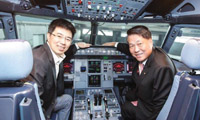Low-Cost Carriers
Budget fever spreading across Asia
From India to Taiwan, budget capacity is expanding with more carriers, including traditional full-service airlines, entering an increasingly competitive market.
February 1st 2014
It’s the fastest growing airline sector in the region, and like the most popular girl at the prom, the low-cost sector continues to attract enthusiastic suitors. Read More »
In the last two months, Taiwan’s national flag carrier, China Airlines (CAL), fellow Taiwanese airline, TransAsia Airways, Singapore’s Scoot and Tigerair, Thailand’s Nok Air and India’s TATA and its partner, AirAsia, announced joint venture budget carriers across several countries as the sector’s expansion burgeons.
 |
| Taiwan embraces LCCs: China Airlines chairman, Sun Huang Hsiang, and Tigerair group chief executive, Koay Peng Yen, have set up budget carrier, Tigerair Taiwan |
In China, as a flurry of new LCC joint ventures were rolled out, Beijing’s added to the booming LCC market dynamics when it unveiled plans to remove price restrictions on domestic air fares and lowered the financial entry point for LCCs to receive approval to fly.
In Shanghai, the megatropolis’ Juneyao Airlines announced its new LCC subsidiary in Guangzhou, Jiuyan Air, with the news that it will offer launch tickets of nine Reminbi (US$1.50).
China’s sole profitable LCC, Spring Airlines, also headquartered in Shanghai, received its long awaited approval to set up a Japanese joint venture, Spring Airlines Japan, at Tokyo Narita international airport. Spring will hold 33% of the joint venture airline that is majority controlled by Japanese investors. Its launch routes will be Narita to Saga, Takamatsu and Hiroshima, respectively.
Approval of Spring’s establishment in Japan was preceded by China Eastern Airlines’ decision to convert one of its domestic subsidiaries, China United Airlines, into a domestic LCC, with bases at former military airport, Beijing Nanyuan, Foshan in southern Guangdong and a yet-to-be announced city in western China.
Last month, the Civil Aviation Administration of China (CAAC) said 23 Mainland airlines will receive subsidiaries of US$150 million to fly to regional cities across the country, which is expected to prompt more airlines to switch to the domestic LCC model.
Across the Taiwan Strait, the announcement by full-service carrier, CAL, that it would establish a 90/10 joint venture LCC with Singapore’s Tigerair had been anticipated by industry insiders for several weeks, after increasingly popular TransAsia Airlines had announced plans to launch an LCC in the next 12 months.
CAL and Singapore Airlines (SIA) controlled Tigerair said their carrier, Tigerair Taiwan, will tap the growing market appetite for budget travel in Taiwan and also counter the increasing market share of the 12 established LCCs that operate into Taiwan.
LCCs accounted for less than four percent of international flights in Taiwan in 2012, but their share grew to nearly six per cent, to 1.9 million passenegers last year, said Taiwan’s Civil Aeronautics Administration (CAA).
CAL Chairman, Sun Huang-Hsiang, said the new venture will begin operations by year end, with initial destinations to include Hong Kong, Macau and Mainland China. CAL will hold a 90% equity (valued at US$61.02 million) in Tigerair Taiwan, said Tigerair group chief executive, Koay Peng Yen, with his subsidiary holding the remaining 10%.
 |
| 'Thailand is Asia’s premier tourist destination and a logical hub for Scoot to expand to' |
| Campbell Wilson CEO Scoot |
Separately Tigerair, which is 40%-owned by SIA, has sold its 40% equity in Tigerair Philippines to local regional LCC, Cebu Pacific, following losses of up to US$66 million at the joint venture LCC. Cebu Air will buy out all other shareholders for US$15 million and take control of the airline. Cebu said it will retain Tigerair Philippines’ branding, with the two carriers agreeing to sell seats on each others’ flights.
In another development, Thailand’s Nok Air has signed a Memorandum of Understanding with SIA’s long-haul, low-cost subsidiary, Scoot, to establish an LCC at Bangkok’s second airport at Don Mueang. NokScoot, operating B777-200s on medium and long-haul international routes, will be 51% owned by Nok with Scoot holding the remaining 49%.
“We are excited at the prospect of expanding Nok’s presence overseas, and to be doing so with the assistance of Scoot. It has always been Nok’s goal to offer Thais more choice and more value, of which this venture is yet another example. We’re also excited at the opportunity to encourage more inbound tourists, to boost the Thai economy,” said Nok chief executive, Patee Sarasin.
Until the recent recurrence of political unrest in Thailand, the country was Asia’s premier tourist destination, which should provide Scoot with a logical expansion of its network.
Also waiting in the wings is AirAsia India, in partnership with India’s Tata group, which is planned to be launched this year. Recently, at the signing of an order for another 25 A330s for long-haul LCC, AirAsia X, co-founder and director of AirAsia X, Tony Fernandes, said the order would cater for expansion in Malaysia and the Thai AirAsia X hub, as well as other long-haul ventures planned across Asia. The fleet expansion would strengthen connectivity between the short-haul and long-haul networks, he said. Fernandes plans to re-enter the Japanese market following the recent abandonment of the joint All Nippon Airways (ANA) / AirAsia joint venture, AirAsia Japan, and ANA’s launch of a stand-alone LCC, Vanilla Air, last Octoder. .
Once Spring Airlines Japan is flying, it will be competing with Vanilla Air as well as Peach Aviation and Jetstar Japan.